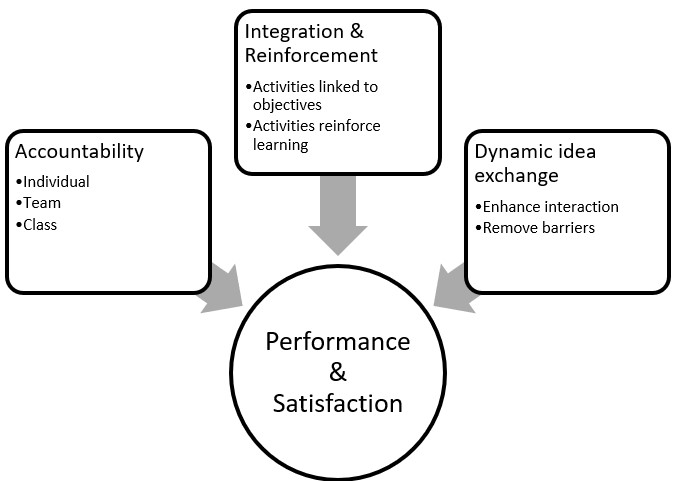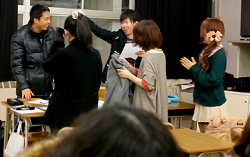Three Keys to Winning with Teamwork
Throughout the workshops, we will apply three keys to winning with teamwork [See Image 2] (Michaelsen, 1998):
- Accountability at the individual, team, and classroom level.
- Integration and reinforcement of learning and activities.
- Dynamic idea exchange through interaction.

Key One: Accountability
Accountability is critical to a successful team (Jex, 2002; Michaelsen, 1998). In sports, individuals who do not build their skills or show up to practice can cause the entire team to suffer. Likewise, failures to accept, acknowledge, and develop individual team members may diminish individual motivation and ability to contribute to team success.
Applying accountability to team learning in the classroom, students who fail to prepare for teamwork can become a drag to team success. Students who are ready and motivated to perform may be forced to carry the workload of lazy students who do not prepare. Additionally, improperly managed team conversations will likely degenerate into social events where the team cannot accomplish tasks or achieve goals.
Effective teams avoid the problems of individual laziness and social loafing by doing the following (Jex, 2002):
- Making individuals accountable for team performance.
- Making the teams accountable for individual development.
In team learning, individuals become accountable by preparing for team activities and participating in team activities. Teams demonstrate accountability by providing individual team members with feedback and support. Members also enforce accountability through anonymous assessment during the reflection process at the end of each workshop (Michaelsen, Knight, & Fink, 2002; University of Phoenix, 2004).
Individual accountability
The Readiness Assurance Process is designed to promote individual accountability (Michaelsen, Knight, & Fink, 2002). The Readiness Assurance process requires that individuals complete a multiple-choice quiz on the reading materials for the workshop. Students are individually accountable because the individual scores count toward the individual's total points earned for the workshop. Next, during the team quiz, each member converses about each question to develop a consensus on the correct answers.
These conversations generate immediate feedback that helps individual students adjust or strengthen their understanding of the materials. In addition, the conversations provide team members with evidence of an individual’s preparation. Members who are unprepared or who do not contribute receive a lower score from team members and faculty during the Reflection step.
Team accountability
Without team accountability, neither instructor nor students know (1) if the students have achieved their learning goals or (2) if students are taking teamwork seriously (Michaelsen, Knight, & Fink, 2002). Teams can foster accountability by developing practices that do the following:
- Encourage individuals to prepare for team activities
- Facilitate individual participation in team activities
- Help individuals feel comfortable contributing to team conversations and projects
- Foster positive and productive communication
In addition to taking an active interest in creating an environment that fosters mutual development, your team should also recognize that contributing to the development of other teams could help your team members strengthen their understanding and skills. Your team can be accountable for classroom development by demonstrating and applying learning from workshop concepts in your team projects. This will not only help to reinforce learning for everyone in the classroom, but it will also help to show how different teams can use the same concepts to develop different solutions.
Key Two: Link goals and activities
The second key to effective teamwork is to link individual, team, and organizational goals (Michaelsen, Knight, & Fink, 2002). We all share goals of academic, professional, and life success. The workshop readings, assignments, and activities should help us develop knowledge and skills for increasing success at school, work, and in life.
By integrating our goals with team and classroom activities, we can do the following:
- Increase motivation by connecting classroom activities to real-world applications.
- Enhance learning through reinforcement.
- Foster personal growth through mutual development.
To enhance mutual development, individuals will read the same materials, teams will apply lessons from the readings to the same problems, and teams will present their solutions to the class during the same workshop.
Key Three: Stimulate idea exchange
Applying the same concepts to the same assignments will help us reinforce learning and allow us to see how different teams use the same concepts to develop different solutions to the same problem. Exchanging ideas at the individual, group, and classroom levels will enhance creativity and enrich learning (Michaelsen, Knight, & Fink, 2002).
Your success as a team depends on the contributions and success of your team members. The more individuals participate in the team activities, the more successful the team can be. You will see that the readings for each workshop may be challenging. However, you should also find that discussing the readings with your team during the tQuiz helps you to understand better. Similarly, you will see that the workshop activities are too challenging to complete by yourself. However, you also should find that working on the activities with your team makes it easier to accomplish your goals.
Successful teamwork requires we put aside reserve and engage actively with our teams. Each team member should feel comfortable contributing ideas, asking questions, and proposing solutions. The more your team members exchange ideas, the more creative your solutions will become.





![Your brain can keep growing, adapting, and learning at any age, if you are willing to put in the effort [Image: Copilot]](/images/Images/best-years-for-adult-brain300.png)
